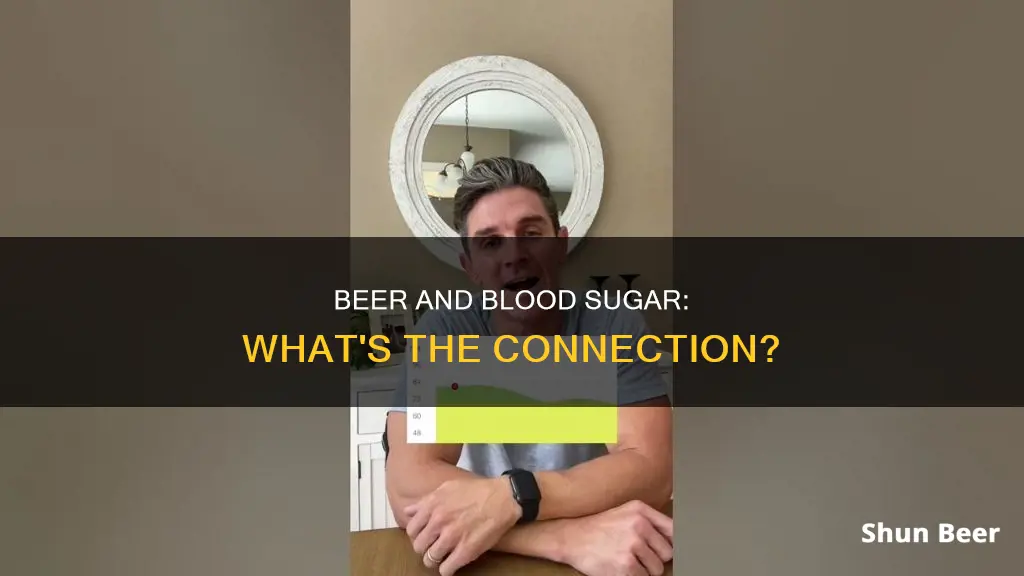
Alcohol can have a confusing effect on blood sugar levels. Beer contains carbohydrates, which are absorbed into the bloodstream relatively quickly, leading to increased glucose levels. Usually, elevated blood sugar is seen shortly after consuming alcohol. However, drinking a lot of beer can also reduce blood glucose levels, leading to hypoglycaemia. The effects of alcohol on blood sugar can be seen up to 12 hours after the last drink. People with diabetes need to be particularly cautious when consuming alcohol as it can affect blood sugar levels and interfere with diabetes medication.
| Characteristics | Values |
|---|---|
| Effect on blood sugar | Beer can increase blood glucose levels, especially in people with diabetes. |
| Alcohol content | Beer typically contains 4-5% ABV, but this can vary. Craft beers tend to have a higher ABV than bottled beers. |
| Carbohydrate content | Regular lagers typically contain 10-15g of carbohydrates per pint. Light beers may have less than 10g, and some less than 5g. Stouts, porters, and Guinness tend to be higher in carbohydrates. |
| Calories | Beer contains calories and can contribute to weight gain. |
| Recommendations | People with diabetes should drink in moderation and only when their blood sugar levels are well-managed. It is recommended to drink beer with food and to avoid drinking on an empty stomach. |
What You'll Learn
- Beer can increase blood sugar levels due to its carbohydrate content
- Drinking a lot of beer can also reduce blood sugar levels, which can be dangerous
- Alcohol interferes with blood sugar regulation by disrupting the liver's function
- Alcohol can affect the effectiveness of diabetes medications
- Beer and other alcoholic drinks are high in calories, which can lead to weight gain

Beer can increase blood sugar levels due to its carbohydrate content
The carbohydrate content in beer can vary depending on the type and brand. Regular lagers typically contain 10 to 15 grams of carbohydrates per pint, while some light beers may have less than 10 grams per pint, and a few have less than 5 grams. Stouts, Porters, and Guinness tend to have a higher carbohydrate content, with upwards of 20 grams of carbohydrates per pint. Certain real ales may also fall into this higher range, especially if they are flavoured with extra sugar or honey.
The impact of beer on blood sugar levels is not limited to the carbohydrate content alone. Beer, like other alcoholic beverages, interferes with the body's ability to regulate blood sugar. The liver, which is responsible for releasing glucose into the bloodstream and breaking down toxins, prioritises metabolising alcohol over maintaining stable blood glucose levels. This disruption can lead to a drop in blood sugar levels, a condition known as hypoglycaemia.
Additionally, alcohol stimulates the appetite, which may lead to overeating and further increases in blood sugar levels. Beer and other alcoholic drinks also contain a significant number of calories, which can contribute to weight gain and make it more challenging to manage diabetes.
It is important to note that the effects of beer on blood sugar levels can vary from person to person. People with diabetes need to be particularly cautious when consuming beer or any alcoholic beverage. It is recommended to consult a doctor or healthcare professional to understand the specific impact on an individual's health and to receive personalised guidelines for safe consumption.
Sugar Quantity for Brewing 40 Pints of Beer
You may want to see also

Drinking a lot of beer can also reduce blood sugar levels, which can be dangerous
Beer and other alcoholic drinks can have a confusing effect on blood sugar levels. While beer contains carbohydrates that can increase blood glucose levels, drinking a lot of beer can also reduce blood sugar levels, which can be dangerous.
The liver is the organ that stores and releases glucose (sugar) into the bloodstream. It does this between meals and while you sleep to help maintain healthy blood sugar levels. The liver is also in charge of breaking down toxins so they can be flushed out of your body by your kidneys. When you drink alcohol, your liver has to work to remove the alcohol from the blood instead of managing blood sugar levels. This can lead to a situation called hypoglycemia, where your blood sugar drops too low.
The risk of hypoglycemia is higher when drinking alcohol on an empty stomach, as the liver chooses to metabolize the alcohol over maintaining your blood glucose. This is why it is recommended to avoid drinking on an empty stomach and to always drink in moderation. The American Diabetes Association recommends that women should not consume more than one drink per day, while men should not exceed two drinks per day.
Additionally, the symptoms of low blood sugar can be similar to those of consuming too much alcohol, such as slurred speech, drowsiness, confusion, and difficulty walking. This can make it challenging to distinguish between the two conditions. Furthermore, alcohol can interfere with diabetes medications, reducing their effectiveness. Therefore, it is crucial for individuals with diabetes to monitor their blood sugar levels and consult their doctor before consuming alcohol.
In summary, while beer can increase blood glucose levels due to its carbohydrate content, excessive beer consumption can lead to a dangerous drop in blood sugar levels. This is because alcohol interferes with the liver's ability to regulate blood sugar. It is important to drink in moderation, preferably with food, and to be aware of the symptoms of low blood sugar to avoid any potential health risks associated with hypoglycemia.
Stag Beer's Sweet Secret: Sugar Content Revealed
You may want to see also

Alcohol interferes with blood sugar regulation by disrupting the liver's function
Alcoholic beverages like beer can affect the liver, but they can also have harmful effects on other organs. The liver is one of the most complex organs in the body, with functions including filtering toxins from the blood, aiding digestion, regulating blood sugar and cholesterol levels, and helping fight infection and disease.
Alcoholic liver disease is damage to the liver and its function due to alcohol abuse. Alcoholic liver disease occurs after years of heavy drinking, and over time, scarring and cirrhosis can occur. Cirrhosis is the final phase of alcoholic liver disease. Alcoholic liver disease does not occur in all heavy drinkers, but the chances of getting the disease increase the longer one has been drinking and the more alcohol they consume.
The liver stabilizes glucose levels by storing carbohydrates and releasing them into the bloodstream between meals and overnight. It is also the body's detoxification center, breaking down toxins like alcohol so the kidneys can easily flush them away. However, the liver is not great at multitasking. When you drink alcohol, the liver will choose to metabolize the alcohol instead of maintaining your blood glucose, which can lead to hypoglycemia. This often happens when you drink without eating food, so consider snacking while you sip.
Beer vs. Whiskey: Sugar Content Face-off
You may want to see also

Alcohol can affect the effectiveness of diabetes medications
Additionally, alcohol may reduce the effectiveness of some diabetes medications, including hypoglycaemic medications. For example, metformin, a medication that decreases insulin resistance, is not suitable for patients whose liver is not functioning properly due to alcohol abuse. Similarly, troglitazone, another medication that decreases insulin resistance, should not be used by patients with liver disease, including alcohol-induced liver damage. Alcohol may also cause an unpleasant, disulfiram-like reaction in people taking chlorpropamide, a medication used to treat type 2 diabetes.
It is important for people with diabetes to be aware of these potential interactions and to consult their doctor before consuming alcohol, to ensure that their medication will remain effective and safe.
Beer and Sugar: The Surprising Truth About Your Brew
You may want to see also

Beer and other alcoholic drinks are high in calories, which can lead to weight gain
The calories from alcohol are stored in the liver as fat. Liver fat makes liver cells more insulin resistant and can make your blood sugars higher over time. Beer and sweetened mixed drinks are high in carbohydrates, which can raise blood sugar levels. Small amounts of beer and sweet wines can be high in carbohydrates, which can cause a temporary rise in blood sugar.
The more alcohol you consume, the higher your risk of experiencing low blood sugar. Alcohol can affect your blood sugar levels immediately after drinking, but its effects can be seen up to 12 hours after your last drink. The risk of low blood sugar remains for hours after your last drink. The more drinks you have at one time, the higher your risk.
If you have diabetes, it is pretty common for your blood sugar to be low at times. Alcohol can make this worse, causing your blood sugar to drop very low—below 70 mg/dL—which is known as hypoglycemia. When you drink alcohol, your liver has a difficult time breaking down alcohol and releasing glucose regularly. When this happens, your blood sugar levels aren't steady and can drop too low. This is even more likely to happen when you drink without eating any food.
Sugar in IPA Beer: How Much Is Too Much?
You may want to see also
Frequently asked questions
Beer is not high in blood sugar, but it can cause blood sugar to increase temporarily due to its carbohydrate content.
Beer can cause an increase in blood sugar levels as it contains carbohydrates that are absorbed into the bloodstream relatively quickly. However, drinking a lot of beer can also lead to reduced blood sugar levels, as alcohol interferes with the body's ability to regulate blood sugar.
For people with diabetes, drinking beer can cause low or high blood sugar levels. Beer is high in carbohydrates, which can raise blood sugar levels. Additionally, alcohol may reduce the effectiveness of diabetes medications. It is recommended that people with diabetes drink in moderation and only when their blood sugar levels are well-managed.
Yes, switching to low-carb beer options may be a good idea for people with diabetes. Light beers, such as Miller64 and Michelob Ultra, have fewer carbohydrates and calories compared to regular beers.
If you have diabetes and want to drink beer, it is important to drink in moderation and only with food, especially carbohydrate-rich foods. Avoid drinking on an empty stomach or when your blood sugar levels are already low. Monitor your blood sugar levels before, during, and after drinking. It is also recommended to consult with your doctor to understand how alcohol may affect you and get guidelines based on your specific health concerns.







